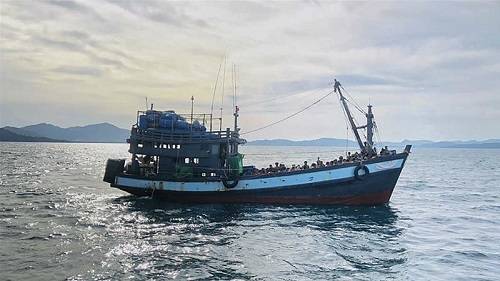by Faisal Mahmud
Rights groups urge Dhaka to allow some 500 Rohingya stuck in the Bay of Bengal to come ashore.
The Bangladesh government has refused to allow some 500 Rohingya refugees stranded on board two fishing trawlers in the Bay of Bengal to come ashore, drawing criticism from rights groups.
Foreign Minister AK Abdul Momen told Al Jazeera on Saturday that the Rohingya refugees, who are believed to have been at sea for weeks, are "not Bangladesh's responsibility."
"Why you are asking Bangladesh to take those Rohingyas? They are in the deep sea, not even in Bangladesh's territorial water," Momen said, adding that there are at least eight coastal countries surrounding the Bay of Bengal.
"It's your duty to ask Myanmar government first because those are their citizens," Momen told Al Jazeera.
The two trawlers - carrying an estimated 500 Rohingya women, men and children - are in the Bay of Bengal after being rejected by Malaysia, which has imposed restrictions on all boats in light of the coronavirus pandemic.
According to the United Nations refugee agency, UNHCR, the stranded Rohingya might "have been at sea for weeks without adequate food and water."
Momen said that just weeks ago, Bangladesh rescued a total of 396 Rohingya people from a vessel that had been adrift for about two months after also failing to reach Malaysia.
"Why should Bangladesh take the responsibility every time? Momen asked. "Bangladesh has already taken more than a million of Rohingya. We are running out of our generosity now."
On Saturday, Human Rights Watch (HRW) said the government of Bangladesh should immediately allow stranded refugees ashore and provide them with the necessary food, water, and healthcare.
"Bangladesh has shouldered a heavy burden as the result of the Myanmar military's atrocity crimes, but this is no excuse to push boatloads of refugees out to sea to die," said Brad Adams, Asia director at HRW.
"Bangladesh should continue to help those at grave risk and preserve the international goodwill it has gained in recent years for helping the Rohingya."
'No such boats'
Bangladesh's coastal authorities meanwhile, denied the presence of any trawlers carrying Rohingya refugees in its territorial waters.
Speaking to Al Jazeera, Lieutenant Commander Sohail Rana, Teknaf station head of Bangladesh coastguard said they had not seen any "boats carrying Rohingya refugees in Bangladesh's territorial water in the past few days".
"The areas that we patrol have no such boats," Rana said.
A Bangladeshi fisherman, however, told HRW that on April 20 he saw "two trawlers full of Rohingya coming toward the shore while I was at sea in my fishing trawler with others".
The same day, a local resident posted on Facebook: "Again, trawlers full of Rohingya are heading to Baharchara Union [in Cox's Bazar]. They are waiting at sea to enter into Bangladesh."
It is believed that most of the Rohingya refugees on board the trawlers had left refugee camps in Bangladesh in an attempt to reach Malaysia, according to HRW.
The organisation reported that it had spoken to 10 families who said their family members had left the camps and they had not heard from them since.
A mother from Kutupalong extension camp told HRW: "One of my sons left the camp some two months ago. Around 20 days back, I got a phone call from my son to pay money to smugglers. We paid. But we have not heard anything since."
'Bangladesh alone can't take responsibility'
In a statement, HRW said, "Bangladesh should continue to uphold its international obligations not to return refugees to places where they face persecution, and not to return anyone to where they would face a risk of torture or other ill-treatment."
HRW also said that "all countries, including Malaysia and Thailand, have the responsibility under international law to respond to boats in distress, enact or coordinate rescue operations within their search and rescue operations, and not to push back asylum seekers risking their lives at sea."
Amnesty International last week called on Southeast Asian governments to launch immediate search and rescue operations for potentially hundreds more Rohingya refugees languishing at sea.
The COVID-19 pandemic, Amnesty International said, cannot be a pretext for governments to abandon their responsibilities towards refugees.
"All countries in the region have a responsibility to ensure the seas do not become graveyards for people seeking safety. Bangladesh cannot be left to address this situation alone. The fact that it is upholding its own obligations is not an excuse for others to abandon theirs," said Biraj Patnaik, South Asia director at Amnesty International.
The Bangladeshi foreign minister, however, pointed out that other countries need to come forward to help the Rohingya.
"Please ask UN and other countries like USA, UK and Canada to shoulder some responsibility. We are ready to send Rohingya people to their country if they are willing to take them," Momen told Al Jazeera.
Source: Aljazeera.com


 Home
Home Discover Islam
Discover Islam Quran Recitations
Quran Recitations Lectures
Lectures
 Fatwa
Fatwa Articles
Articles Fiqh
Fiqh E-Books
E-Books Boys & Girls
Boys & Girls  Ramadan
Ramadan Fatwa Audios
Fatwa Audios Month of Mercy
Month of Mercy Women
Women Eed Al- Fitr
Eed Al- Fitr Food Recipes
Food Recipes Videos
Videos

 Prayer Times
Prayer Times












